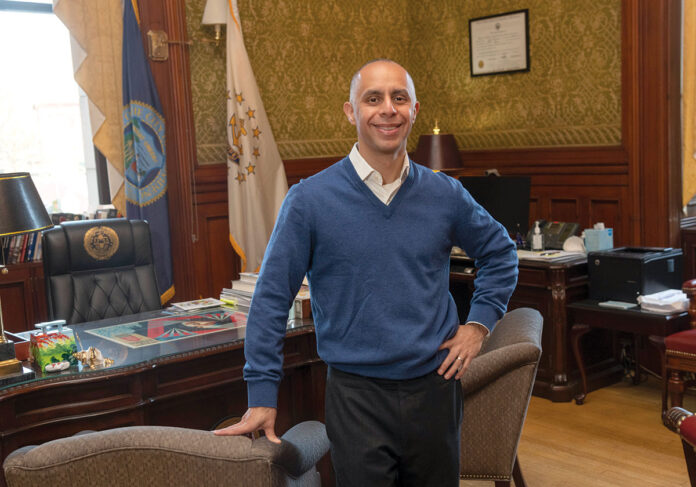The wave of highly publicized crimes that has swept through Providence in recent months has prompted no shortage of calls for action, but looming elections and political strategy might be making it difficult to reach concrete solutions.
The problems – gun violence, illegal all-terrain vehicles and a lack of law enforcement officers – are complex and don’t have easy answers, as Public Safety Commissioner Steven M. Paré told members of the Providence City Council at an Aug. 10 special meeting. There are also new approaches being developed behind the scenes, which Paré declined to explain in a recent interview because making them public could undermine their effectiveness.
But elections next year for a number of city and state offices are also to blame for stalled progress, said Wendy Schiller, a
Brown University political science professor.
“Right now, constituent-building and policy coalitions are taking precedence over policy choices,” she said. “If it wasn’t an election year, I think you’d be able to move forward in a more productive way.”
That’s not uncommon. According to Schiller, policy changes often slow as elections draw closer. And the number of competitive city and state races coming up in the next year – including for governor and Providence mayor – have potential candidates and political coalitions reluctant to make decisions that could hurt their campaigns, Schiller said.
That includes sensitivity to the racial undercurrent influencing the discussion, especially when it comes to ATV riders, who are largely people of color. Schiller faulted some politicians for failing to communicate clearly that condemnation of ATVs does not mean they are criticizing an entire ethnic or racial group.
“Nobody in that community wants to be scapegoated or stereotyped,” she said. “Officials need to go out of their way to say that no one group of people is inherently to blame.”
While lawmakers may be hesitant to enact sweeping policy changes, some are quick to point fingers at political opponents. Gov. Daniel J. McKee and Mayor Jorge O. Elorza, who is a likely candidate in the 2022 gubernatorial race, continue to dispute details of the governor’s offer to lend state police assistance to the city.
In an interview on Aug. 23, Elorza said that what state police have offered is insufficient to get ATVs off the streets and curb illegal gun sales. Elorza insisted that political motivations played no role in his criticisms.
Alana O’Hare, a spokeswoman for McKee, said in an emailed response, “If the mayor needs additional support from the state to keep residents safe, we again encourage him to begin by accepting the assistance of the Neighborhood Response Team, which can serve as a proactive measure to curb violence, deter crime and provide a feeling of safety for city residents.”
Meanwhile, City Council President John J. Igliozzi had harsh words for the city administration, including Paré, who he said was undermining law enforcement’s ability to do its job.
“He has two choices: step up or step out,” Igliozzi said in a recent interview.
Igliozzi also did not mince words when it came to fellow council members who have disagreed with increased funding for the police department and instead wanted to put the money toward nonviolence and community organizations.
“They are asking for an electrician to do plumbing work,” Igliozzi said.
Achieving consensus among a 15-person council is rarely possible, especially when the problem is multifaceted; gun violence, ATVs and law enforcement funding and structure are related but also separate and require separate solutions.
Igliozzi insisted that they are all equally important and of equal urgency to solve. Paré, meanwhile, said addressing the spike in homicides in the last year is his top priority, while Councilwoman Rachel Miller said she wanted to see a bigger role for community organizations in tackling the factors that lead to violence, such as poverty and lack of housing.
Schiller agreed that the city needs to consider a broader approach.
“If you don’t address housing, education and gun violence all at the same time, you can’t solve the problem,” she said.
The education piece is particularly difficult given that Providence Public Schools are under state control, Schiller added.
Nancy Lavin is a PBN staff writer. You may reach her at Lavin@PBN.com.











One partial solution to reducing crime in Providence (or any city) is to End Hunger. Bear with me. Ending hunger will not only help take away one of the reasons for committing crime/robberies – desperate people do desperate things – it will help address the resulting anger that hunger fosters in our communities. It’s not a stretch, it’s reality. (I know if I witnessed any member of my family going hungry, I could resort to drastic methods.)
I propose we immediately work to create food secure communities.
One tie-in could be – bear with me again – mass gun buyback programs that include a reward of (significant) food gift certificates.
I’ve heard arguments that gun buyback programs are ineffective. I propose we review the data, weigh the pros and cons and if there are any pros at all, we move to implement.
HUNGER? Are you kidding me! These individuals committing these crimes are NOT hungry….Free housing, food stamps, free health benefits, EVERYTHING FOR FREE! AND then receive FREE MONEY FROM THE GOVERNMENT (stimulus money) to spend on guns, off road vehicles, cell phones, eye lash extensions, fake nails, tattoos and every other NON FOOD items they can get their hands on! PLEASE STOP WITH THE BLEEDING HEART HUNGER LOAD OF MILARKY! GO TO WORK! IDOL HANDS BREADS EVIL…..DID YOU EVER HEAR THAT GROWING UP? GO TO WORK!